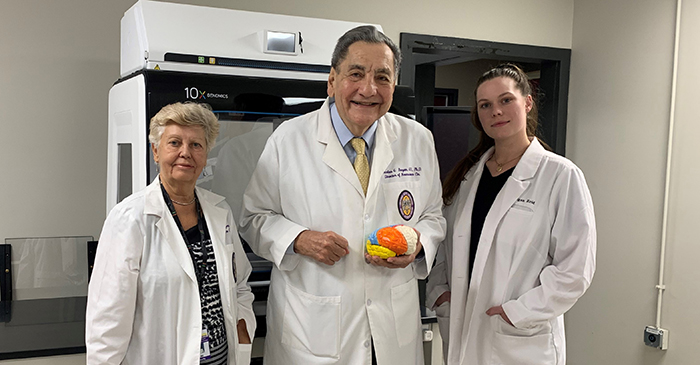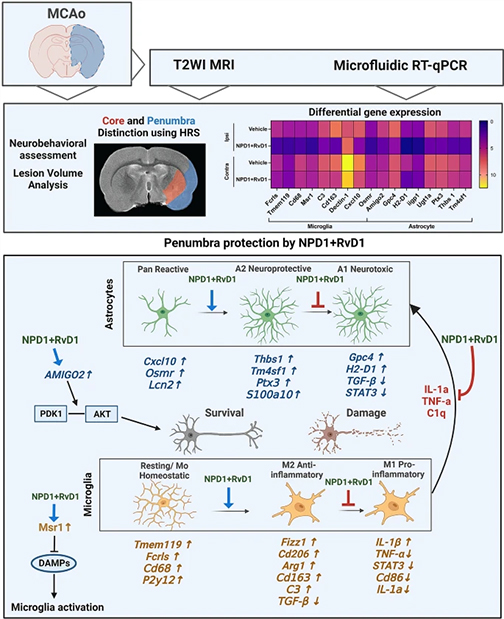LSU Health New Orleans Researchers Discover Potential New Rx Strategy for Ischemic Stroke
June 6, 2023

A study conducted by scientists at LSU Health New Orleans’ Neuroscience Center of Excellence reports that the additive neuroprotection of a combination of two omega-3 fatty acid-derived signaling molecules is more effective in protecting brain cells and increasing recovery from stroke in an experimental model than a single drug. Results were published online in Cellular and Molecular Neurobiology, available here.
“We discovered a compelling effective combinatorial therapy in experimental stroke,” notes Nicolas Bazan, MD, PhD, Director of the LSU Health New Orleans Neuroscience Center and senior author of the study. “Despite increasing knowledge of the physiologic, mechanistic, and imaging characterizations of stroke, no effective neuroprotective therapy has been found to date. Most current work uses different approaches with a ‘single’ bullet therapy. Since stroke is so complex and due to multiple damaging factors, we extensively explored a multidisciplinary approach, a combinatorial therapy, that yielded promising beneficial results.”The research team examined the bioactivity of Neuroprotectin D1 (NPD1 - discovered by the Bazan lab in 2003) combined with Resolvin D1 (RvD1) in experimental stroke. These two naturally occurring neuroprotective molecules in the brain derived from docosahexaenoic acid (DHA) and eicosapentaenoic acid (EPA) called docosanoids have been shown to limit excessive inflammatory responses, regulate metabolism and immune cell functions, decrease the production of proinflammatory factors, and promote tissue repair and stability. Under Dr. Bazan’s guidance, LSU Health New Orleans graduate student and first author Madigan Reid designed and performed gene expression studies that showed the combination treatment elicited the selective expression of genes contributing to cell survival.
“We show that NPD1 + RvD1 remarkably improves neurological function and reduces lesion volume in acute ischemic stroke when administered promptly in moderate doses,” adds Ludmila Belayev, MD, Professor of Neurosurgery, Neurology and Neuroscience at LSU Health New Orleans Neuroscience Center. “We also demonstrated a broad therapeutic window of neuroprotection with moderate doses of NPD1 + RvD1, such that treatment initiated even 6 hours after stroke onset is highly effective. This combinatorial therapy may promise future therapeutic development against ischemic stroke.”

“The biological activity of NPD1 plus RvD1 is due to specific activation and modulation of signaling pathways associated with the immune system, inflammation, cell survival, and cell-cell interactions,” concludes Dr. Bazan. “These findings provide a major conceptual advance of broad therapeutic relevance for cell survival, brain function and, particularly, stroke and neurodegenerative diseases.”
LSU Health New Orleans authors also included graduate students Madigan M. Reid, Gethein Andrew, and Jeff X. Ji, along with Drs. Bola F. Habeb, Marie‑Audrey I. Kautzmann, Larissa Khoutorova, and Pranab K. Mukherjee. Other authors were Andre Obenaus from the University of California, Irvine, and Cassia R. Roque and Reinaldo B. Oria from Federal University of Ceara, Fortaleza, Brazil.The research was supported by grants from the National Institutes of Health’s National Institute of Neurological Disorders and Stroke and Brazilian CAPES.
______________________________________________________________________________________________________________ LSU Health Sciences Center New Orleans (LSU Health New Orleans) educates Louisiana's health care professionals. The state's health sciences university leader, LSU Health New Orleans includes a School of Medicine with campuses in Baton Rouge and Lafayette, the state's only School of Dentistry, Louisiana's only public School of Public Health, and Schools of Allied Health Professions, Nursing, and Graduate Studies. LSU Health New Orleans faculty take care of patients in public and private hospitals and clinics throughout the region. In the vanguard of biosciences research, the LSU Health New Orleans research enterprise generates jobs and enormous annual economic impact. LSU Health New Orleans faculty have made lifesaving discoveries and continue to work to prevent, advance treatment or cure disease. To learn more, visit http://www.lsuhsc.edu, http://www.twitter.com/LSUHealthNO, or http://www.facebook.com/LSUHSC.
